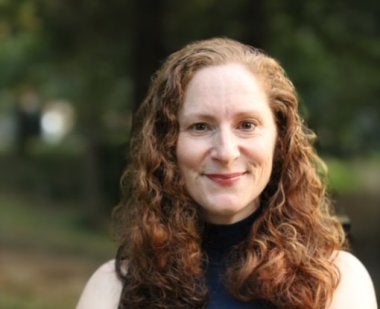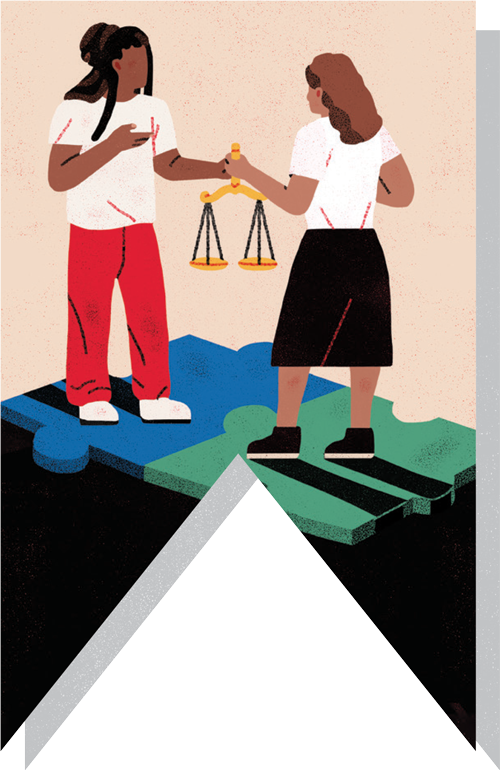
Funded by a Grand Challenges Team Project Grant from the University of Maryland, the Racial and Social Justice Research-Practice Partnership Collaborative addresses racial and social injustices in education through equal, mutually beneficial partnerships between faculty and staff at UMD and educators in local school districts.
The collaborative is one of 11 projects involving College of Education faculty that were funded by Grand Challenges Grants earlier this year. In all, the university awarded more than $30 million to 50 projects addressing pressing societal issues, including educational disparities, social injustice, climate change, global health and threats to democracy. The Grand Challenges Grants Program is the largest and most comprehensive program of its type in the university’s history.
Led by Christine M. Neumerski, senior research fellow at the College of Education’s Center for Educational Innovation and Improvement (CEii), this project includes colleagues from the School of Public Policy, Office of Community Engagement and College of Education.
Neumerski discusses how ongoing, equitable partnerships between researchers and practitioners can create lasting change.

What is a research-practice partnership?
In research-practice partnerships (RPPs), we break down the traditional power roles where the university positions itself as an expert. Instead, we create equitable, trusted partnerships in which both researchers and practitioners believe in and value each other’s expertise and knowledge. It’s a two-way, long-term relationship in which researchers and practitioners come together to cocreate research questions that both parties believe are important and relevant.
RPPs can be an important lever for change. But they’re not easy to do. That’s because RPPs demand that we don't do business as usual. Instead of doing research on our schools, we’re asked to do research with them and to create a much more equitable situation as we design our research projects to be meaningful and usable for practitioners.
How will this collaborative help to increase racial and social justice in education?
Our project begins with the premise that racial and social injustices in our school systems are one of the biggest challenges that our students face today. In this collaborative, we will partner with four local school districts: Anne Arundel, Howard, Montgomery and Prince George’s County Public Schools. We’ve met with the equity directors of each of these partner districts. They’re beginning to think collaboratively across districts about common challenges related to racial and social justice. Once we have gone through the process with the school districts to identify the problems we want to address, we will fund two faculty members at UMD who will build out an RPP.
Part of the goal of this collaborative is to build our collective capacity to do this work. We will provide opportunities for people to come together to learn about best practices for RPPs in general and to pool their knowledge and expertise.
What strengths do your partners from across the university bring to the collaborative?
We’re able to think about problems from many different angles. We like to think about it as equity of voice. Our colleagues in the School of Public Policy, Assistant Professor Apolonia Calderon and Associate Clinical Professor Brandi Slaughter, have done really interesting work with marginalized children and communities. You can’t disentangle what’s happening with racial and social justice in our districts from the broader policies that contribute to those inequities. Our partner, Gloria Aparicio Blackwell ’92, director of the Office of Community Engagement, is helping us remember that schools and school systems are nested in larger communities. She'll be pushing us to think about what other members of the community we need to be collaborating with.
Why does this issue matter to you personally?
I started out as a teacher, working with highly marginalized student populations. I loved making an impact with my students, but I became frustrated by some of the larger systemic barriers that were denying my students opportunities. I decided to go to graduate school to learn about what people are doing about the structural challenges students are facing. When I got there, it was like stepping into a different world. I realized how separate education research and practice had become. I’ve worked on many meaningful research projects, yet we don’t always have a good way to share findings with the people who could use them. This collaborative is a perfect opportunity to build a mechanism to bridge that divide with the aim of addressing racial and social injustices in our schools.
| EdTerps on the Leadership Team Christine M. Neumerski, senior research fellow, CEii (Principal Investigator) Douglas W. Anthony ’92, M.Ed. ’01, Ed.D. ’16, senior fellow, CEii Segun Eubanks Ed.D ’12, director, CEii Cherise J. Hunter ’01, M.Ed. ’02, Ph.D. ’11, fellow, CEii Sonya Riley Ph.D. ’19, manager, professional development schools partnerships and programs Pamela Shetley, associate director, Ed.D. in School System Leadership program Jean Snell M.A. ’98, associate director, CEii |
|||||||||||||||||||||||||||||||||||||||||||||||||||||||||||||||||||||||||||||||||||||||||||||||||||||||||||||||||||||||||||||||||||||||||||||||||||||||||||||||||||||||||||||||||||||||||||||||||||||||||||||||||||||||||||||||||||||||||||||||||||||||||||||||||||||||||||||||||||||||||||||||||||||||||||||||||||||||||||||||||||||||||||||||||||||||||||||||||||||||||||||||||||||||||||||||||||||||||||||||||||||||||||||||||||||||||||||||||||||||||||||||||||||||||||||||||||||||||||||||||||||||||||||||||||||||||||||||||||||||||||||||||||||||||||||||||||||||||||||||||||||||||||||||||||||||||||||||||||||||||||||||||||||||||||||||||||||||||||||||||||||||||||||||||||||||||||||||||||||||||||||||||||||||||||||||||||||||||||||||||||||||||||||||||||||||||||||||||||||||||||||||||||||||||||||||||||||||||||||||||||||||||||||||||||||||||||||||||||||||||||||||||||||||||||||||||||||||||||||||||||||||||||||||||||||||||||||||||||||||||||||||||||||||||||||||||||||||||||||||||||||||||||||||||||||||||||||||||||||||



